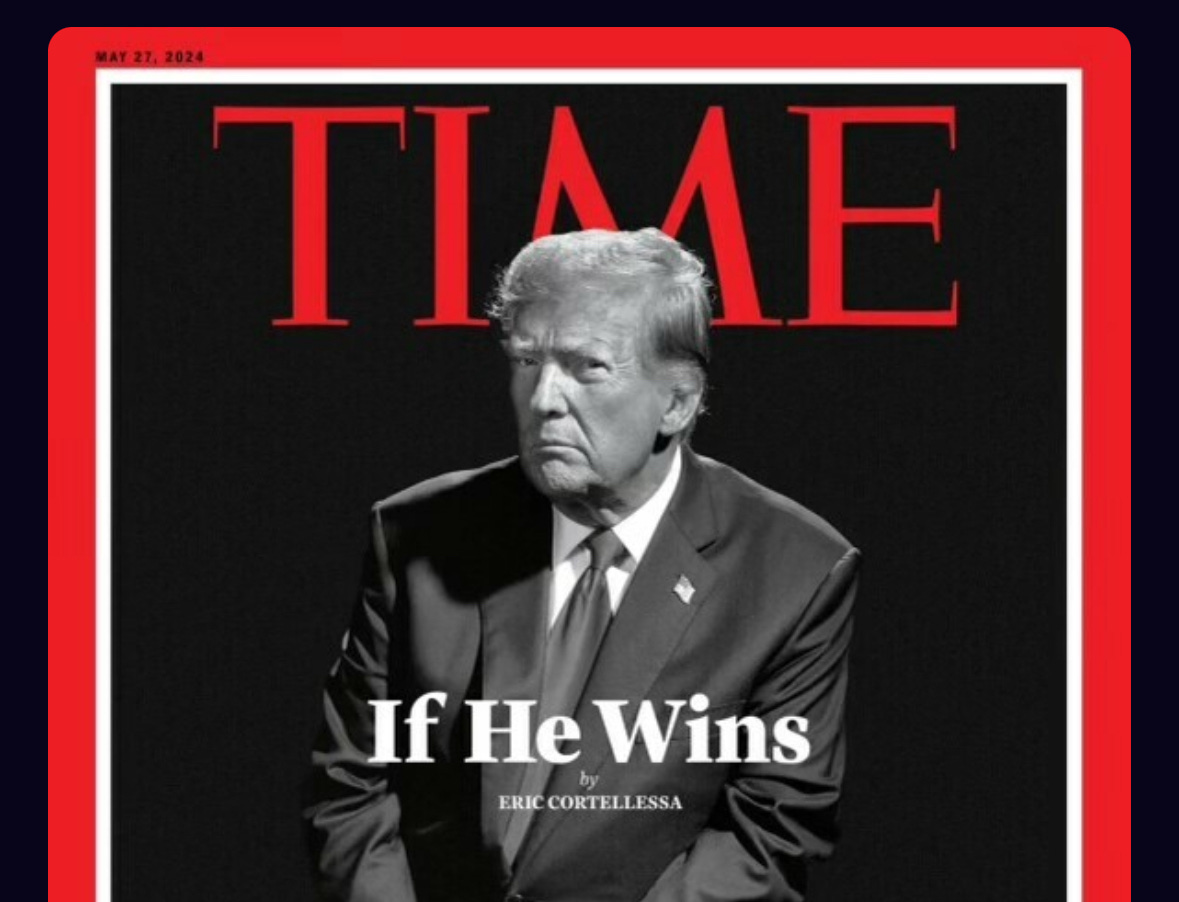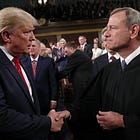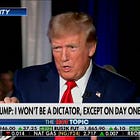He's not even trying to hide it
Trump's Time Magazine interview exposes a malevolent fool.

PN is a reader-supported publication made possible by paid subscribers. Please click the button to sign up if you haven’t already.
By Noah Berlatsky
This week, Time Magazine released a long interview with Donald Trump in which the former president and current presumptive Republican presidential nominee painted a picture of his plans for an authoritarian and dystopian second term.
Trump promised to target marginalized groups and to use the power of the state against his political enemies. He said he’d let red states monitor pregnancies and talked openly of mass deportations and detention camps.

Trump’s proposals are terrifying. But they’re also remarkably incoherent. What’s most striking in the interview is that Trump, even after four years as president, has virtually no grasp on any policy issue beyond empty talking points, most of which are lies. When asked how he will implement his plans, he waffles, obfuscates, and delivers a stream of non sequitur boasts about how great he is or about how other people have said that he’s great. He lies all the time, but many of his statements on core policy issues are so garbled and gassy they don’t even qualify as lies. It’s like interacting with a chatbot programmed by a fascist parrot.
Trump’s blank, aggressive ignorance shouldn’t be a comfort. He has shown, over and over, that incompetence doesn’t have to undermine evil intent; often it can exacerbate it. He offers a vision of a presidency of cruelty and violence disavowed as it occurs, with every abuse of power accompanied by a vague flurry of denials and endless self-hagiography. Trump promises us, over and over, that he will do harm, and that he will learn nothing.
An assault on migrants and democracy
One of the most frightening parts of the Time interview was Trump’s reiteration and expansion of his promise to torment immigrants.
As a model, he alluded admiringly to President Dwight Eisenhower’s notoriously racist 1954 Operation Wetback, in which the US government used the military to deport 300,000 to one million people to Mexico. The victims of the slapdash, ugly program included many legal immigrants and even many American citizens.
A note from Aaron: Working with brilliant contributors like Noah requires resources. If you aren’t a paid subscriber, please click the button below to support our work.
Trump said he could use local law enforcement to find and deport immigrants; he also suggested using the National Guard and the US military. When Time asked if that would violate the Posse Comitatus Act, which prevents the use of the United States military against civilians, Trump replied by falsely claiming that immigrants “aren’t civilians.” He then bizarrely asserted that the US was being invaded by 29,000 Chinese immigrants of “fighting age” who were “mostly males.” That’s a dogwhistle and a lie intended to imply that immigrants make up a foreign military force on US soil — and to justify extreme violent measures against them.
Trump also reiterated his core commitment to undermining democracy and consolidating authoritarian power. When asked if he would use the Justice Department to prosecute President Joe Biden, he responded that “it depends what happens with the Supreme Court,” which is expected to rule sometime soon on whether Trump should have sweeping immunity from crimes committed in office.
Trump has of course been charged with a slew of crimes, and wants the right-wing court to set aside the Constitution to protect him.
But Trump insisted that if the court does not give presidents immunity, Biden would be prosecuted for “20 different acts,” including “taking a lot of money” (there’s no evidence Biden has been bribed in office in any way) and for “being a Manchurian candidate” (which is not even a coherent accusation, much less a crime). Trump said the prosecution would “probably [have] nothing to do with me,” which is an admission that he’s leaving open the possibility he could personally interfere with the Justice Department in order to force a prosecution of Biden.
Trump didn’t just threaten Biden; he threatened the country as well. When asked whether he was worried about political violence in the November general election, Trump said, “I don’t think you’ll have political violence.” Then he elaborated, “I think we're gonna have a big victory. And I think there will be no violence.” That certainly sounds like Trump is saying that there will be no violence as long as he wins. He also, notably, made no effort to encourage his supporters to remain nonviolent if he loses.

Trump reiterated his enthusiasm and support for political violence in other ways. Importantly, he said he would be open to pardoning all of the more than eight hundred people sentenced for their role in the riot and coup attempt of January 6, 2021. On that date, Trump supporters attacked the Capitol in an attempt to overthrow election results and keep Trump in power. Trump himself has been indicted for his role in the coup attempt. By using his pardon powers to protect people who engaged in political violence on his behalf, he’s signaling that such violence is good and right, and that, as president, he will protect and encourage those who deploy it.
Not just violence, but confusion
Trump’s threats and schemes are grim. But in some ways, highlighting his worst plans and schemes undersells how disturbing the interview is. Summarizing and codifying the policy points makes Trump sound like he is focused, or at least like he has a general understanding of what he’s saying or thinking.
Reading the whole interview, though, it’s clear that Trump does not know anything about anything. His mind is a series of hazy orange corridors filled with dead ends, open pits, and trip wires. He stumbles through the maze, thunking gently off the walls, every so often belching forth a random quasi-anecdote or catch phrase. Here a steel executive weeps with gratitude at sight of Trump; there people spontaneously break into laughter when Trump says he’s going to be a dictator on day one; over here, Trump confusingly argues that his former National Security Advisor John Bolton "served a good purpose because he's a nutjob." And no, there's no context in which that statement make sense.
Again, these layers of fantasies, excuses, self-justifications, and boasts are so convoluted and meaningless that it’s hard to even fact check them or call them lies. Per philosopher Harry Frankfurt, Trump is a master of (or mastered by) “bullshit” — he is utterly indifferent to whether his words are true or false.
In some cases, Trump bullshits somewhat like a normal politician because he doesn’t want to take a solid position. On abortion rights, for example, he refused to say whether he would sign a 15-week abortion ban because he knows such bans are popular with his base and deeply unpopular with everyone else. And he refused to say whether women should be able to get mifepristone, though in a classic twist he did promise to make a statement on the matter in two weeks.
In the interview, Trump even openly admits he’s dodging some issues for political reasons, as when he takes credit for covid vaccines while saying that he doesn’t want to take credit for them because they’re unpopular with Republicans. (“The Democrats love the vaccine. The Democrats. Only reason I don’t take credit for it. The Republicans, in many cases, don’t…”)
In other cases, Trump just doesn’t seem to understand his own policies. He insists that tariffs will not increase prices basically because he doesn’t want them to increase prices. (“I've seen — I don't believe it'll be inflation. I think it'll be lack of loss for our country. Because what will happen and what other countries do very successfully, China being a leader of it.”) It’s unclear that Trump even really knows what a tariff is. He often speaks like he thinks we’re charging foreign countries directly, rather than putting an additional tax on foreign goods which consumers have to pay.
And then there are baffling passages where Trump’s motives and cognition fall into a semantic black hole.
In the interview he promises, incredibly, to eliminate Biden’s Office of Pandemic Preparedness and Response Policy. Despite the devastating covid pandemic, which killed over a million Americans, Trump insists that there’s no reason “to spend a lot of money on something that you don't know if it's gonna be 100 years or 50 years or 25 years,” and argues that the office is just “giving out pork.” He adds that the experience of the pandemic means that “I think we've learned a lot and we can mobilize, you know, we can mobilize” — missing the obvious point that one of the things the pandemic taught us is that you need to have systems in place before the pandemic begins if you want to “mobilize.”
Ignorant malevolence, malevolent ignorance
Is Trump’s opposition to the pandemic response office a knee-jerk rejection of all things Biden? Is it meant to appease Republicans who have decided they hate all public health measures? Or is it just a reflection of Trump’s penny-pinching? The rest of the interview is filled with him boasting about saving money or forcing other countries to pay the United States. Trump’s refusal to pay his bills is legendary; miserliness is his one real ethical commitment.
The motive doesn’t matter much, even to Trump. The interview as a whole paints a clear picture of a vain, vindictive man locked in an information bubble of one.
Trump does not want to win the presidency to advance an agenda to help Americans or create a better world. He wants to win the presidency to glorify himself and to harm those he hates — including immigrants, Democrats, and anyone who has ever contradicted or crossed him. He dismisses any obstacle to total power — like the Posse Comitatus Act — not least because he barely knows that such obstacles exist.
You don’t want to be ruled by a tyrant. You don’t want to be ruled by a fool. But God help us if we put ourselves again in the hands of this orange, hateful, bloviating tyrannical fool.
Aaron talks through turbulent times with Mike McFeely
By Aaron Rupar
As campus protests roil the nation and divide the Democratic coalition six months out from an existential election, I joined Mike McFeely’s podcast on Wednesday to talk at length about the fraught state of American society.
McFeely is a columnist for the Fargo Forum who I’ve known for a long time. (I went on his podcast once previously, just days after January 6.) I thought we had an interesting and in depth conversation about how I got my start covering Trump in 2016, the evolution (or devolution) of MAGA over the years, Biden’s precarious reelection prospects, what a Trump victory this year would mean, and much more.
Check out our discussion below.
Buckle up. It’s gonna be a bumpy ride until November. Hopefully we can land the plane safely.
That’s it for today
We’ll be back with more tomorrow. If you appreciate this edition of the newsletter and aren’t already a subscriber, please sign up. Paid subscribers make PN possible.
Thanks for reading.







America is truly in decline if this remains a competitive race. I say that with love for this country but also with a deep trauma regarding the last several years and how our system has enabled such a man because of the nation's inability to reckon with historical deficiencies.
"What’s most striking in the interview is that Trump, even after four years as president, has virtually no grasp on any policy issue beyond empty talking points, most of which are lies." Trump has run his business organization by doing whatever he wants, whenever he wants, and by ignoring the law whenever it suits his purpose so it's hardly surprising that he ran the country the same way. We also need to focus on the people around him as they are also malevolent and care only about their own power and greed. Some of what he talks about is what is fed to him from these people.